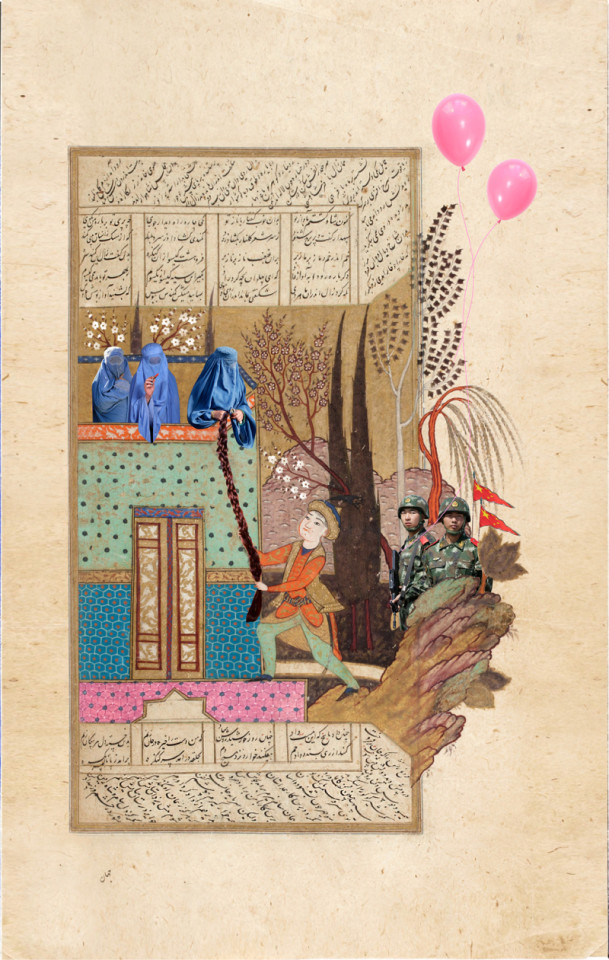Rudaba Makes a Ladder of Her Tresses for Zal, 2021
23ct Gold leaf, Rabbit skin glue and acrylic hand painted miniature on Hahnemühle William Turner paper
45.5 x 28.5 cm
17 7/8 x 11 1/4 in
17 7/8 x 11 1/4 in
Edition of 3 plus 2 AP
Copyright The Artist
A suite of four miniatures taken from the ancient epic poems Shahnameh, or Persian Book of the Kings introduce a further element of subversion. Rezaei has selected illustrations from specific...
A suite of four miniatures taken from the ancient epic poems Shahnameh, or Persian Book of the Kings introduce a further element of subversion. Rezaei has selected illustrations from specific accounts of Iran’s ancient history (at the time areas of modern day Afghanistan fell within the Persian Empire) that are relevant to the current political climate in the middle east. She has manipulated the images, both digitally and by hand, adding and removing elements thus altering the messages of the original works.
Rudaba, princess of Kabul, daughter of Mehrab Kaboli and Sindukht, is renowned for her extraordinary beauty. Zai, a legendary Iranian king from Sistan heard about Rudaba when he was passing through Kabul and fell in love with her from the description he was given: "lashes like raven's wings...the moon...her face" One of Rudaba’s maids smuggled Zai to her pavilion and Rudaba threw down her tresses for him to climb up to visit with her. He declined her offering, not wanting to hurt her, and used a rope instead.
Rezaei has covered the famed beauty of Rudaba with an Afghan burqa in the traditional blue preferred by the Taliban. We cannot see her face, nor those of her attending maids, yet Zai still shows a strong desire to scale the wall to meet her. Two Chinese soldiers stand to the side but do not engage with the protagonists of the scene. They are watching us, gauging our response to the unfolding events. Two figures expressionless and detached, irreproachable yet complicit.
Rudaba, princess of Kabul, daughter of Mehrab Kaboli and Sindukht, is renowned for her extraordinary beauty. Zai, a legendary Iranian king from Sistan heard about Rudaba when he was passing through Kabul and fell in love with her from the description he was given: "lashes like raven's wings...the moon...her face" One of Rudaba’s maids smuggled Zai to her pavilion and Rudaba threw down her tresses for him to climb up to visit with her. He declined her offering, not wanting to hurt her, and used a rope instead.
Rezaei has covered the famed beauty of Rudaba with an Afghan burqa in the traditional blue preferred by the Taliban. We cannot see her face, nor those of her attending maids, yet Zai still shows a strong desire to scale the wall to meet her. Two Chinese soldiers stand to the side but do not engage with the protagonists of the scene. They are watching us, gauging our response to the unfolding events. Two figures expressionless and detached, irreproachable yet complicit.



